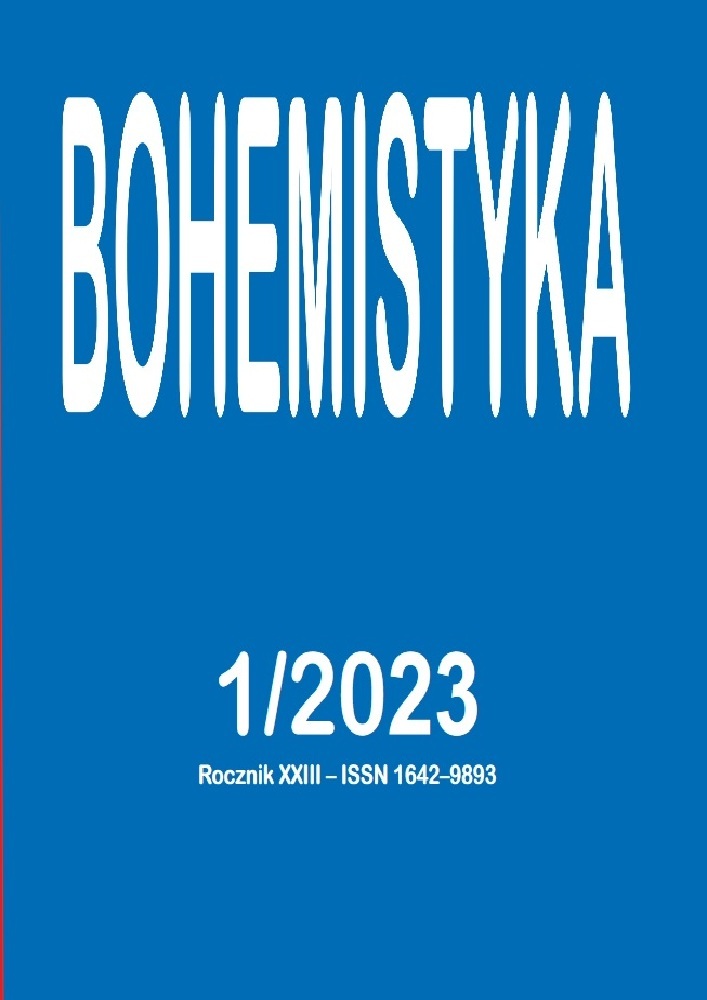Abstrakt
Declensional morphology of nouns in Czech and Russian is investigated and compared. It is shown that, in general, word forms which are more similar to their lemmas are preferred, but there are differences between animate and inanimate nouns and also among grammatical genders. The frequency distribution of grammatical cases is also studied, with animacy and gender being again important factors.
Finansowanie
Supported by research grants APVV SK-AT-20-0003 (J. Mačutek, M. Koščo- vá, E. Kelih), VEGA 2/0096/21 (J. Mačutek, M. Koščová), and APVV-21-0216 (J. Mačutek).
Bibliografia
Benko, V., 2014, Aranea: Yet another family of (comparable) web corpora. In: P. Sojka, A. Horák, I. Kopeček & K. Pala (eds.), Text, Speech and Dialogue, Cham: Springer, pp. 247–254. DOI: https://doi.org/10.1007/978-3-319-10816-2_31
Comrie, B., Corbett, G.G., 1993, Introduction. In: B. Comrie & G.G Corbett (eds.), The Slavonic Languages, London, New York: Routledge, pp. 1–9.
Deza, M.M., Deza, E., 2009, Encyclopedia of Distances, Berlin, Heidelberg: Springer. DOI: https://doi.org/10.1007/978-3-642-00234-2
Doleschal, U., 2009, Nominale Kategorien: Genus. In: Kempgen, S., Kosta, P., Berger, T. & Gutschmidt, K. (eds.), Die slavischen Sprachen. Ein internationales Handbuch zu ihrer Geschichte, ihrer Struktur und ihrer Erforschung. Band 1, Berlin, New York: de Gruyter, pp. 143–152.
Gvozdanović, J., 2009, Synthetismus and Analytismus im Slavischen. In: Kempgen, S., Kosta, P., Berger, T. & Gutschmidt, K. (eds.), Die slavischen Sprachen. Ein internationales Handbuch zu ihrer Geschichte, ihrer Struktur und ihrer Erforschung. Band 1, Berlin, New York: de Gruyter, pp. 129–142.
Hentschel, G., Menzel, T., 2009, Nominale Kategorien: Kasus. In: Kempgen, S., Kosta, P., Berger, T. & Gutschmidt, K. (eds.), Die slavischen Sprachen. Ein internationales Handbuch zu ihrer Geschichte, ihrer Struktur und ihrer Erforschung. Band 1, Berlin, New York: de Gruyter, pp. 161–176.
Kelih, E., 2009, Slavisches Parallel-Textkorpus: Projektvorstellung von “Kak zakaljalas’ stal’ (KZS)”. In E. Kelih, V. Levickij & G. Altmann (eds.), Methods of Text Analysis, Chernivtsi: ČNU, pp. 106–124.
Klenin, E., 2009, Animacy, personhood. In: Kempgen, S., Kosta, P., Berger, T. & Gutschmidt, K. (eds.), Die slavischen Sprachen. Ein internationals Handbuch zu ihrer Geschichte, ihrer Struktur und ihrer Erforschung. Band 1, Berlin, New York: de Gruyter, pp. 152–161.
Levelt, W.J.M., Roelofs, A., Meyer, A.S., 1999, A theory of lexical access in speech production. Behavioral and Brain Sciences 22(1), pp. 1–38. DOI: https://doi.org/10.1017/S0140525X99451775
Levenshtein, V.I., 1965, Binary codes capable of correcting deletions, insertions, and reversals. Soviet Physics Doklady 10(8), pp. 707–710.
Mačutek, J., Čech, R., 2013, Frequency and declensional morphology of Czech nouns. In: I. Obradović, E. Kelih (eds.), Methods and Applications of Quantitative Linguistics, Belgrade: Akademska Misao, pp. 59–68.
Meyer, G.L., 1973, Common tendencies in the syntactic development of “two”, “three”, and “four” in Slavic. The Slavic and Eastern European Journal 17(3), pp. 308–314. DOI: https://doi.org/10.2307/306507
Mluvnice češtiny, 1986, díl 2. Tvarosloví, 1986, Praha: Academia.
Short, D., 1993, Czech. In: B. Comrie & G.G Corbett (eds.), The Slavonic Languages, London, New York: Routledge, pp. 455–532.
Straka, M., 2018, UDPipe 2.0 prototype at CoNLL 2018 UD Shared Task. In: D. Zeman, J. Hajič, M. Popel, M. Potthast, M. Straka, F. Ginter, J. Nivre & S. Petrov (eds.), Proceedings of the CoNLL 2018 Shared Task: Multilingual Parsing from Raw Text to Universal Dependencies, Stroudsburg (PA): ACL, pp. 197–207.
Timberlake, A., 1993, Russian. In: B. Comrie & G.G Corbett (eds.), The Slavonic Languages, London, New York: Routledge, pp. 827–886.
Zipf, G.K., 1949, Human Behavior and the Principle of the Least Effort. Cambridge (MA): Addison-Wesley Press.
Licencja
Prawa autorskie (c) 2023 Ján Mačutek, Michaela Koščová, Emmerich Kelih, Radek Čech

Utwór dostępny jest na licencji Creative Commons Uznanie autorstwa – Użycie niekomercyjne – Bez utworów zależnych 4.0 Międzynarodowe.





